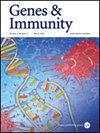FGL1促进而非抑制针对微卫星不稳定胃癌的抗癌免疫。
IF 4.5
3区 医学
Q1 GENETICS & HEREDITY
引用次数: 0
摘要
微卫星不稳定性(Microsatellite instability, MSI)是一种以肿瘤细胞中微卫星序列长度变化为特征的表型,与肿瘤的发生和预后密切相关。免疫检查点抑制剂在msi高(MSI-H)胃癌(GC)中显示出良好的治疗效果。然而,新型免疫检查点纤维蛋白原样蛋白1 (FGL1)在胃癌治疗中的作用尚未得到充分研究。采用生物信息学方法分析MSI/微卫星稳定性(MSS)患者GC组织中FGL1的表达及FGL1免疫浸润的差异,并在临床样本中进行验证。在人免疫重建小鼠中构建MSS和MSI GC异种移植模型,检测FGL1在肿瘤中的表达。采用免疫荧光法和免疫组织化学法检测两类小鼠免疫细胞的浸润情况。细胞毒性试验和趋化性试验分别检测CD8+T细胞对GC细胞的毒性和趋化性。采用酶联免疫吸附法检测细胞因子含量。通过异种移植小鼠模型分析FGL1抗体对不同类型胃癌的治疗作用。FGL1在GC中的表达量显著高于MSI GC,且MSI GC中FGL1的表达量和免疫细胞浸润水平显著高于MSS GC。CD8+T细胞对MSI GC细胞的杀伤和趋化作用明显优于MSS GC细胞。FGL1抗体治疗MSI型GC更有效。新型免疫抑制剂FGL1抗体对MSI GC有良好的治疗效果。这些发现为开发靶向FGL1治疗MSI GC的药物提供了基础。本文章由计算机程序翻译,如有差异,请以英文原文为准。

FGL1 facilitates rather than suppresses anticancer immunity against microsatellite instable gastric cancer
Microsatellite instability (MSI) is a phenotype characterized by changes in the sequence length of microsatellites in tumor cells and is closely linked to tumorigenesis and prognosis. Immune checkpoint inhibitors have shown good therapeutic effects in gastric cancer (GC) with MSI-high (MSI-H). However, the role of the novel immune checkpoint fibrinogen-like protein 1 (FGL1) in GC treatment has not been fully investigated. FGL1 expression in GC tissues and the difference in FGL1 immune infiltration between MSI/ microsatellite stability (MSS) patients were analyzed by bioinformatics and were verified in clinical samples. Xenograft models of MSS and MSI GC were constructed in human immune reconstitution mice, and FGL1 expression in tumors was detected. Immunofluorescence and immunohistochemistry were used to assay the infiltration of immune cells in the two types of mice. Cytotoxicity and chemotaxis tests were used to detect the toxicity and chemotaxis of CD8+T cells to GC cells, respectively. The cytokine content was detected by enzyme-linked immunosorbent assay. The therapeutic effects of FGL1 antibody on different types of GC were analyzed by xenograft mouse models. FGL1 exhibited significantly higher expression in GC, and its expression and immune cell infiltration levels were significantly higher in MSI GC than in MSS GC. CD8+T cells were significantly more effective in killing and chemotaxis of MSI GC cells than MSS GC cells. The FGL1 antibody was more effective in treating MSI GC.The novel immunosuppressor FGL1 antibody exerts a good therapeutic influence on MSI GC. These findings provide a basis for the development of drugs targeting FGL1 for MSI GC treatment.
求助全文
通过发布文献求助,成功后即可免费获取论文全文。
去求助
来源期刊

Genes and immunity
医学-免疫学
CiteScore
8.90
自引率
4.00%
发文量
28
审稿时长
6-12 weeks
期刊介绍:
Genes & Immunity emphasizes studies investigating how genetic, genomic and functional variations affect immune cells and the immune system, and associated processes in the regulation of health and disease. It further highlights articles on the transcriptional and posttranslational control of gene products involved in signaling pathways regulating immune cells, and protective and destructive immune responses.
 求助内容:
求助内容: 应助结果提醒方式:
应助结果提醒方式:


